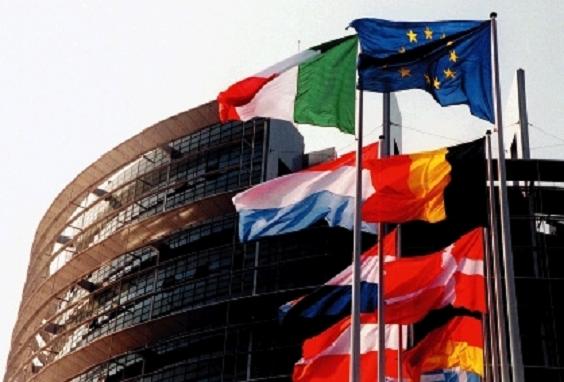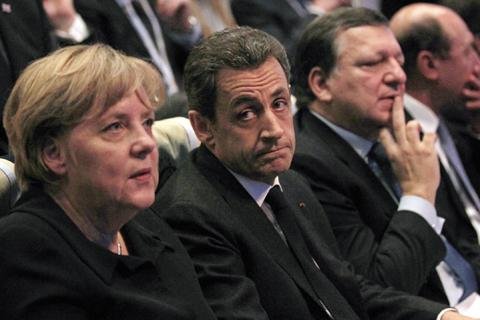| NSPM in English | |||
Radical European Politics or New Colonialism? |
 |
 |
 |
| уторак, 13. август 2013. | |
|
European realities, however, today are, as it seems, much closer to Gray’s diagnosis that “if architects have imagined the EU as a new world model, current dogma refers to the opposite turn.”[2] This means that mythologization of the EUhas conditioned its appearance as the counterexample i.e. as anti-model but simultaneously that new differentiation, first of all on social, and then on national basis, has brought closes the contemporary condition to Balibar’s radical insight that “Europe is a dead political project”, because “some countries are dominant while others are dominated.”[3] Such turn is, above all, a natural and logical consequence of the fact that what has essentially been excluded from the official EU discourses and practices are precisely the national moment and the social moment. This further means the following: (1) the gap between EU’s crypto-political elites and the people has dramatically grown in last few years (2) this gap signified the deepening of social and economic inequalities because of which class has again appeared as a relevant political name (3) the result of the national question being treated – in accordance with mainstream neoliberal or postmodern discourses – as either fascistic or anachronic, is that nationalism via patriotism is practically back on front doors. Or, more precisely, the fact that radical politics of left and right are, let us say, newborn and blossoming, is caused by EU’s elite choice of its own theoretical and political paradigm i.e. choice of concepts which were meant to wither away both left and right, creating a contradicio in adjecto: a political community without political subjectivity. How these processes historically unfolded in the so-called “third way” politics and self-proclaimed “social-democracy” and through an empty formula proclaiming the path “beyond right and left”, has been articulated by Mouffe, while Cooper’s Breaking of Nations appears as an irreplaceable example of plea for post-national post-modern political order that the EU was conceptualized to represent. The bottom line, therefore, is that the EU has been built as a political simulacrum i.e. that its both “left” and “right” politics were formulated to imitate both of them and that the source of this action is, for the most part, found in Ali’s statement that Europe has been “the prisoner of Atlantism” – a situation that has also produced weakening of critical thinking and lack of (political and other) imagination.
In such way, first decades of the 21 century – with spreading of economic, political and social crisis and gradual, yet systemic turn of global discourses – in theoretical and practical sense have brought the growth of euro-realism and euro-skepticism. The EU crisis appeared as crisis of the political, as crisis of political participation, crisis of democracy in practically all its aspects and crisis of political subjectivity, which is to say, in the light of crisis of legitimization of the European project per se. In his article “Nationalism Returns in Europe” Gvozdev has written that “radical right parties are becoming mainstream political actors” and that sentiments about “our dignity” and “our state” echo in European countries. [4] Greek “Golden Dawn”, Hungarian “Movement for better Hungary”, French “National Front” are just some examples of this movement which can also be traced on the level of strengthening of aspirations to leave the EU i.e. through the fact that while practically half of British population wishes to step out of the Union and slightly more than half of Germans wish to stay. Simultaneously, these processes are accompanied by growth of separatist movements (Catalonia, Scotland, Belgium…), and all three aspects of return of radical politics are caused by crypto-elites, dominating as a particular class whose interests are not interests of the people. Relevance of social and national issues appears as a specific appeal for egalitarianism i.e. equality and justice, but likewise for national dignity, while the enlargement of repressive and control mechanisms reciprocally risk fear turning into anger, as a political emotion par excellence.
The birth of contemporary critical European discourses of left and right, this way, is exemplified in series of discrepancies between official politics of the Union and life in European states i.e. between EU dogma and European realities. This makes Ash speak of „non-functional European triangle“, composed of national politics, European politics and world market, and enables his conclusion that there is no more „European politics“ nor „European public sphere“, for the only constant becomes Euroepan political Rashomon. In a similar fashion, Sambanis articulated that the European crisis is more and more taking the shape of identity - ethnic conflict, and that for this reason it is practically certain that what is at stake is the end of one form of European project.[5] These investigations disclose that the Union no longer has the image of an alternative or progressive project and, moreover, that it unveils itself as a conception which the new century finds as passe in greatest degree. In agreement with Sambanis, we can say that the gap between „north“ and „south“ is a testimony of a gap which has become so huge that currently it is easier to imagine a potential conflict then closer alliance. It is of particular significance that the places of potential conflict are based in social and national differentiation, and that these interrelate on the level of actions of trans-national Euro-Atlantic imperial structures, on the one hand, domestic „elites“ on the other, and majority of the people on the third side. These are key reasons for which it would irresponsible to claim anything decisively about the future of the Union – but they indisputably signify the perplexity of contemporary processes occurring on European grounds. The question for us is now the following: if the rise of radical politics, reversely, speaks about the movement of the Union towards structural differentiation, then where is the place for democracy and/or place for the political here? Or, if has become clear that we can no longer refer to the EU as to the „alliance of equal states and people“, is it perhaps, seemingly paradoxically, the case that potentials for democracy and political subjectivity appear precisely in such a situation?
Because, if the logic of European integration has brought into question the value of democratic order in its historical, political and cultural sense, is it plausible to claim that contemporary reverse processes, will end differently? For now, however, such an objective possibility is opened, and it is proportional to participation of citizens i.e. to subjectivation and re-politization. When even Sen writes that „perhaps the most problematic aspect of current European disease is...exchange of democratic obligations with financial dictates“, and that „Europe cannot surrender itself to unilateral understandings – or good intentions – of experts, without public debates and informed consent of its citizens“[6], it appears that issues of democracy and political subjectivity, with birth of contemporary European discourses, show themselves in a most serious way. But, if such presuppositions for rise of true democracy are manifested, we are still dealing with a potentiality i.e. with a possibility opposed to another possibility, the alternative of new colonialism. Here we can turn to Ash, who argues that in the 1990s it has been precisely West Germany i.e. „its elites, and majority of people, who demonstrated great loyalty to European integration...“[7] What can we conclude from the insight that „the Germans demonstrated prudence which other countries have not“, and that, partially, their „rescue“ of southern states always counts on their own interests as well?[8] Ash reminds that – contrary to Thomas Mann words – today we see more and more of Germany’s Europe and less of European Germany.
In other words, Germany has appeared as the key actor of „project of European integrations“ and degree of its loyalty towards this project politically corresponded to the level of its concern for its own interests, so that its overall growth comes forth as a consequence of fall of other states. With all differences acknowledged, one can recall here Hegelian master-slave dialectic, and rethink this along the lines of multi-level domination of Germany in Europe. In such sense, the meaning of Genscher’s saying that „the more our foreign politics is European, the more national it is!“ appears in a new light. Moreover, there is much political and moral irony in the fact that precisely cities as Athens, Madrid or Lisbon – as polis-es in which the faith that, at least in minimal sense, there is formal equality of all EU member states, if not a serious conviction of essentially equality of different nations – have become live examples of greatest inequalities and injustice. On the other hand, it is indisputable that there exists a historical and political basis to the fact that the indignados are becoming indignados of a larger number of European countries and that, rising against politicians and bankars they are in reality standing up against EU crypto-elites and therefore appearing as heralds of new political subjectivity and true democracy. To what extent will we see an affirmation of theses that these processes will be shaped around trans-national strikes, as potential key movements of mass European protests – which would mean that we are dealing with a new class struggle[9] - or rather a different theses that national issues will be decisive – will depend on various circumstances which cannot be calculated since they, by their concept, belong to the category of the event per se. But, for the time being, one should trace the birth, logics and growth of contemporary critical European discourses keeping in mind that it is not rare, even in terms of economics – that things are not as what they appear to be.[10] (presentation at the XXIII World Congress of Philosophy, August 4, Athens) [1] Habermas, J., “Für einen Kurswechsel in der Europapolitik” Frankfurter Allgemeine Zeitung,03.08.2012. [2] Grey, J. “Why Europe is floundering”, The Guardian, October 17 2012. [3] Balibar, E. „Europe is a Dead Political Project“, The Guardian, June 6 2010. [4] Gvosdev, N. „Nationalism Returns in Europe“, The National Interest Online, November 5 2012. [5] Sambanis, N. “Has Europe Failed?”, The New York Times, August 26 2012. [6] Sen, A. „The Crisis of European Democracy“, The New York Times, May 22 2012. [7] Ash, T.G. „The Crisis of Europe“, Foreign Affairs, September/October 2012.p.4. [8] Ibid.p.8. [9] Wagenknecht, S. “The Strike in Southern Europe”, Global Research, November 12 2012. [10] Tooze, A. „Germany’s Unsustainable Growth“, Foreign Affairs, September/October 2012. |
Остали чланци у рубрици
- Playing With Fire in Ukraine
- Kosovo as a res extra commercium and the alchemy of colonization
- The Balkans XX years after NATO aggression: the case of the Republic of Srpska – past, present and future
- Из архиве - Remarks Before the Foreign Affairs Committee of the European Parliament
- Dysfunction in the Balkans - Can the Post-Yugoslav Settlement Survive?
- Serbia’s latest would-be savior is a modernizer, a strongman - or both
- Why the Ukraine Crisis Is the West’s Fault
- The Ghosts of World War I Circle over Ukraine
- Nato's action plan in Ukraine is right out of Dr Strangelove
- Why Yanukovych Said No to Europe

.jpg)
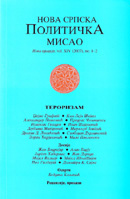
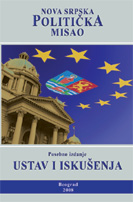
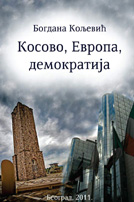





 To what extent has EU become a par excellence example of cancellation of rationality, equality and freedom has been extensively analyzed by Habermas, most notably in his workThe Crisis of the European Union. Here the thesis about different aspects of democratic deficit, as well as the qualification that the Union has stepped into a post-democratic era, is convincingly elaborated. Drawing the key argument about monopolization of the European project by self-proclaimed elites – that has produced bureaucratization and moving away from European citizens – Habermas, however, concludes that a systemic turn is necessary for the future of the Union i.e. that one should not give up on this cause of European unification for that would mean “departure from participation in world history.”
To what extent has EU become a par excellence example of cancellation of rationality, equality and freedom has been extensively analyzed by Habermas, most notably in his workThe Crisis of the European Union. Here the thesis about different aspects of democratic deficit, as well as the qualification that the Union has stepped into a post-democratic era, is convincingly elaborated. Drawing the key argument about monopolization of the European project by self-proclaimed elites – that has produced bureaucratization and moving away from European citizens – Habermas, however, concludes that a systemic turn is necessary for the future of the Union i.e. that one should not give up on this cause of European unification for that would mean “departure from participation in world history.”